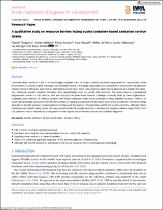A qualitative study on resource barriers facing scaled container-based sanitation service chains

View/
Date
2022Author
Ferguson, Charlie
Mallory, Adrian
Ancianob, Fiona
Russell, Kory
Lopez Valladares, Hellen del Rocio
Metadata
Show full item recordAbstract
Container-based sanitation (CBS) is an increasingly recognised form of off-grid sanitation provision appropriate for impoverished urban environments. To ensure a safely managed and sustainable service, a managing organisation must implement a service chain that performs robustly and cost-effectively, even with an expanding customer base. These ‘CBS operators’ adopt varying approaches to achieve this objective. Following research including interviews with representatives from six current CBS operators, this paper presents a generalised diagrammatic model of a CBS service chain and discusses the three broad thematic challenges currently faced by these organisations. Supplying cover material is a universal problem with hidden challenges when taking advantage of freely available resources. There is no universally applicable approach for the efficient collection of faecal waste despite the high labour costs of waste collection. The best strategy depends on the CBS operator's overall expansion strategy and the location of fixed features within the served community. Although CBS is technically well-suited to being turned into new products within the circular economy, in practice, this requires a diverse range of skills from CBS operators and is hampered by slow growth in other organic waste recovery services and unhelpful regulation. HIGHLIGHTS CBS is a form of off-grid sanitation provision.; Interviews are conducted with representatives from six current CBS operators.; Supplying cover material is a universal problem.; There is no universally applicable approach for the efficient collection of faecal waste.; Although CBS has the po
